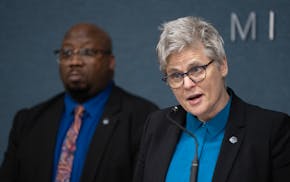SUBSIDIES AND TAXES
The world won't end if business has to pony up
And so the chorus begins. Soon after Gov. Mark Dayton proposes a change in sales tax, countless experts predict the demise of Minnesota as we know it ("Professional firms won't stick around for new tax," Feb. 3). Having interviewed a couple of attorneys who suggest that their business may go away if faced with having to collect a sales tax on its services, business columnist Lee Schafer lays out the case for excluding services from being taxed.
In order to accept this argument, one would need to believe the way people shop for legal help is by price, much like buying a dozen eggs. If the decision to choose a law firm rests solely on price, why don't all of their current customers move business to law firms in Maine, Montana or Wyoming, where the average price per hour for legal services is significantly lower than in Minnesota?
Also, the cofounder of one of the law firms suggests that "at some point, there's a limit" -- an implied threat that he would possibly have to move his firm because the sales tax would impose a disadvantage. This is in spite of his firm maintaining an office in the state of Washington, which already charges a "business and occupation" tax on most services.
To those in service industries who are facing the possibility of having to charge sales tax, don't worry, I am not planning to drive to Iowa to get my hair cut.
WARREN BLECHERT, EXCELSIOR
• • •
I was delighted to see the issue of business subsidies addressed in the commentary by Arthur Rolnick and Mike Meyers ("The subsidy bonanza: Sunk costs," Feb. 3). I was a practicing CPA for more than 50 years, and the media blitz by business that is really no more than a negotiating position has been very effective. The public never seems to question the facts as they are presented. I would make two points:
1) My experience teaches me that three things are primary in business decisions about location: resources (including human), supply chains and markets. There are other factors, but I do not think they are controlling, at least not for successful businesses. This includes taxes.
2) Business has been very successful at pitting states, and even countries, against one another to attract its investments. The public has been poorly represented at the negotiating table.
LAWRENCE E. STIRTZ, SAVAGE
* * *
WOLF HUNT
DNR should let nature take its own course
For four weeks, the Minnesota Department of Natural Resources has been holding public hearings to listen to the thoughts and concerns of the public regarding the wolf hunt. I was not able to attend one of the hearings, unfortunately, but I have a proposal.
The DNR should issue "Save a Wolf" licenses. For every "Save a Wolf" license purchased, a license to hunt or trap a wolf would be removed. I have every confidence that more than 400 Minnesotans would gladly pay the $30 license fee, equivalent to the price in-state hunters pay to kill a wolf, in order to save one.
Nonhunters, it's time to take back our state's DNR and direct its work away from supplying hunters with prey, and toward letting nature manage itself. It's time we learn to live alongside nature and make the compromises to ensure that our state's wildlife exists for its own sake.
VICTORIA THOR, ST. LOUIS PARK
* * *
GUN VIOLENCE
More cops are needed to do weapons checks
I'm saddened that the Star Tribune has yielded its pages to one-sided, emotional hyperbole when it comes to the debate about gun violence.
High-impact, low-probability events like Sandy Hook, while tragic, are not representative of gun violence in the United States.
Studies show most gun violence is not committed with legally owned semiautomatic rifles, but with illegal handguns, which are easily obtained by criminals regardless of restrictions on legal ownership. This is why the 1994 assault-weapons ban had a statistically dubious effect.
In contrast, street-level law enforcement is demonstrably successful. For example, a Kansas City, Mo., initiative involving constitutionally sound street and traffic checks generated a 65 percent increase in seized illegal guns and a 50 percent drop in firearm-related offenses.
Unfortunately, critical staffing shortages in police departments across the country have drastically curtailed the ability of officers to conduct such self-initiated checks. Yet increasing police staffing is an afterthought in the gun debate. In the fight to end gun violence, let's do what works, and start by properly staffing the front lines.
MATTHEW MIRANDA, MINNEAPOLIS
• • •
Recent letters rejecting proposed increased firearms legislation often suggest that reforms are championed by individuals who "fear" guns and "know nothing" about them. As an owner of multiple firearms with a working knowledge and respect for each one, I am also a proponent of background checks, assault weapons restrictions and magazine limits.
I do not fear guns. I find it troubling that some fellow gun owners feel the need to strap a gun to their waist just to have enough courage to walk out the door each day. If we really have a concern that gun laws are being forged during a climate of fear, then certainly those who can't face the day without a gun at their side represent fear far beyond any reasonable level.
TODD EMBURY, RAMSEY
* * *
STATE OF THE STATE
Dayton is committed to our natural resources
I am sorry that the Star Tribune's story about Gov. Mark Dayton's State of the State speech did not include coverage of his strong commitment to Minnesota's natural environment and, in particular, to addressing climate change ("Gov. Dayton delivers up a broadside on budget," Feb. 7). His words are worth repeating: "A healthy life starts with, and depends on, clean air to breathe, clean water to drink, protected natural environments to enjoy, and a secure ecological future."
BRETT SMITH, MINNEAPOLIS

BWCA's future likely hinges on election
Saving the dinosaurs: Why there's a future for community newspapers
Readers Write: Gun storage laws, Uber and Lyft, 24/7 businesses, the pipe organ


